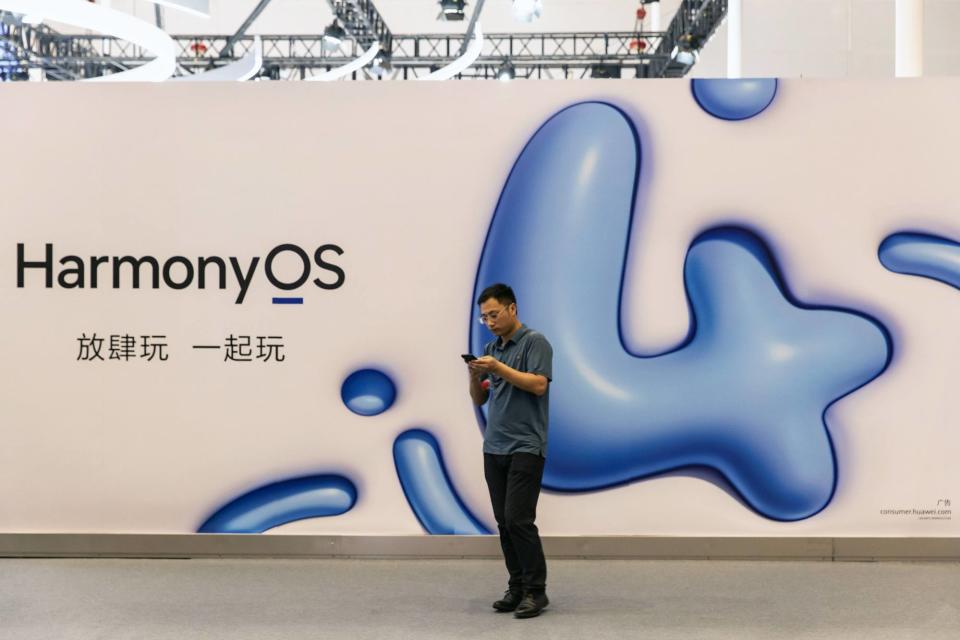Huawei Technologies‘ mobile platform HarmonyOS has overtaken Apple‘s iOS to become the second-biggest mobile operating system in mainland China in the first quarter, according to the latest market data from Counterpoint Research.
HarmonyOS accounted for a 17 per cent share in the first quarter to surpass iOS for the first time in the world’s biggest smartphone market, as strong domestic demand for Huawei’s latest 5G handsets drove up adoption of the Shenzhen-based company’s self-developed mobile operating system, Counterpoint data showed.
US-sanctioned Huawei saw HarmonyOS’ domestic presence more than double, from an 8 per cent share in the first quarter of 2023, on the back of the company’s return to the 5G handset segment last year via its Mate 60 series smartphones.
Do you have questions about the biggest topics and trends from around the world? Get the answers with SCMP Knowledge, our new platform of curated content with explainers, FAQs, analyses and infographics brought to you by our award-winning team.
Apple’s iOS fell slightly behind with a 16 per cent share, while Google‘s Android continued to dominate the market with a 68 per cent share in the same period.


A man stands in front of a billboard advertising Huawei Technologies’ Harmony OS at the Smart China Expo in Chongqing on September 4, 2023. Photo: Bloomberg alt=A man stands in front of a billboard advertising Huawei Technologies’ Harmony OS at the Smart China Expo in Chongqing on September 4, 2023. Photo: Bloomberg>
HarmonyOS’ share is expected to “grow further, as Huawei focuses on supply chain localisation”, according to Counterpoint.
Globally, Android and iOS remained ahead in the March quarter with shares of 77 per cent and 19 per cent, respectively. HarmonyOS had 4 per cent share worldwide in the same period.
The growing domestic adoption of HarmonyOS shows how Huawei’s strategy to build an Android alternative has started to pay off, overcoming the impact of US government-imposed tech restrictions when the company was added to Washington’s Entity List in May 2019.
Under that trade blacklist, Huawei is barred from buying software, chips and other US-origin technologies from suppliers without Washington’s approval. Huawei launched HarmonyOS in August 2019.


Huawei Technologies developed HarmonyOS as an alternative to Google’s Android mobile operating system. Photo: Shutterstock alt=Huawei Technologies developed HarmonyOS as an alternative to Google’s Android mobile operating system. Photo: Shutterstock>
Early versions of HarmonyOS had been criticised as being little more than a variant of Android, but the latest version – HarmonyOS Next, released as a developer preview in February – has seen the competing operating systems further diverge. HarmonyOS Next will no longer support Android-based applications.
Huawei plans to release HarmonyOS Next with the Mate 70 series flagship smartphones later this year, rotating chairman Eric Xu Zhijun said in May.
The company stood out as the best performer among all major smartphone vendors on the mainland in the first quarter when its sales grew 69.7 per cent year on year, according to Counterpoint. The research firm largely attributed that performance to Huawei’s popular 5G Mate 60 series and strong brand reputation, which helped the firm gain more share in the premium segment where handsets are priced from US$600.
As of January, more than 200 partners have initiated development of HarmonyOS-based apps, according to Huawei, which has said it aims to have 5,000 partners on board by the end of this year.
Major enterprises that have started development of HarmonyOS-based apps include Alibaba Group Holding, Meituan, Ant Group, JD.com and McDonald’s China. Alibaba owns the South China Morning Post.
This article originally appeared in the South China Morning Post (SCMP), the most authoritative voice reporting on China and Asia for more than a century. For more SCMP stories, please explore the SCMP app or visit the SCMP’s Facebook and Twitter pages. Copyright © 2024 South China Morning Post Publishers Ltd. All rights reserved.
Copyright (c) 2024. South China Morning Post Publishers Ltd. All rights reserved.

